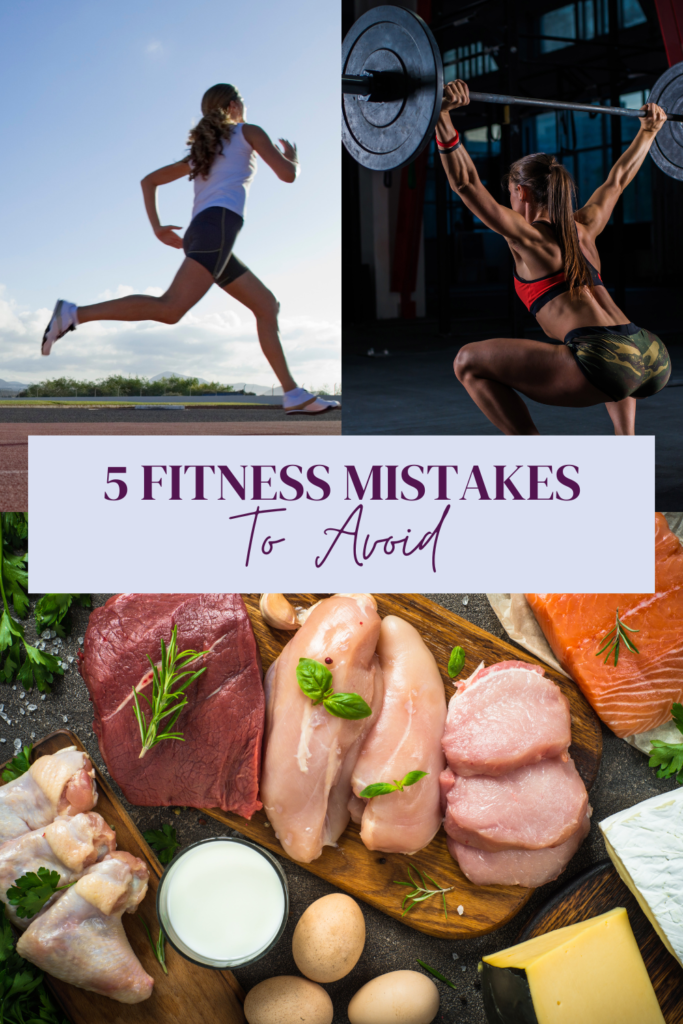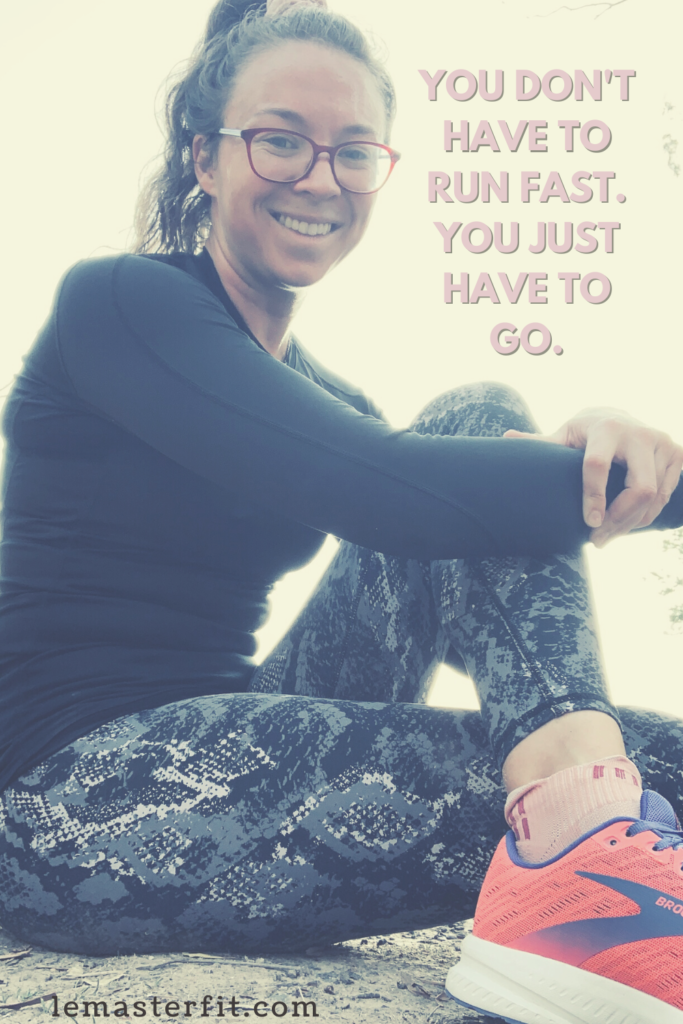Do you ever get tired of nutrition coaches or health nuts giving unsolicited advice (not me–I’m cool)? They demand you do X amounts of cardio a week, Y amounts of HIIT workouts, all with the idea to drop 10 pounds quickly…Let’s dispel a few myths and fitness mistakes people often make:

1. When someone tells you they have a secret tool to help you drop weight quickly, walk away!
Fast weight loss, while possible, usually means that a person has to live in extremes including restrictive eating and overindulging in workout sessions in the gym. These behaviours can become unhealthy and addictive. More importantly, they are not sustainable. You might lose weight, but not for long. Eventually, something triggers you to go eat anything (everything) because you deprived your body of the nutrition it needs to do basic, everyday functions.
So we eat.
And eat.
And eat.
Binge eating can lead to weight can. These behaviours then trigger a guilty conscience because we ate, gained weight, and the entire process will start again. This is where we get the term Yo-Yo dieting. It’s unhealthy, unsustainable, and unsuccessful.
WHY:
Fast weight loss puts people in such restrictive calorie deficits that we miss out on nutrients, which causing fatigue, mood swings, nutrient deficiencies, and compromised immune systems. Restrictive diets also slow your metabolism because it forces your body into starvation mode. All of which affects your overall health and well-being.
Sometimes, forming a new lifestyle habit or trying to determine if certain foods trigger immune responses can start with a limitation phase. It’s important to note that these phases introduced by doctors have an expiry date. Meaning there is a time frame, maybe a week, where you enter a calorie deficit to “jump start” your weight loss. Or, you cut out a certain food for a week to see how your body reacts. But the restrictions ease and a more modest and balanced diet follows. This prevents you from Yo-Yo diets or unhealthy calorie deficits.
What to do:
If your doctor tells you to lose weight, an appropriate goal for weight loss is 1-2 pounds (~1 kg) each week. This goal allows for a more gradual lifestyle change and gives you sufficient time to learn about your body, control behaviours, and appreciate your journey. Combined, this causes you to protect your accomplishments, and not throw all your hard work away! Remember that story of the Tortoise and the Hare? Slow and steady wins the race. That’s true for your weight loss and health journey also!
2. When someone tells you have to do a certain amount HIIT workouts each week to “slim down quickly” tread carefully:
Again, you should always view “quick slim tricks” with scrutiny and proceed with caution.
Excessive HIIT, or high-intensity interval training, workouts have some deleterious effects on the body. Stress levels spike from too much HIIT because physical activity is still a stressor. Specifically, cortisol levels. Cortisol is a stress hormone and the levels are used to detect the level of stress in animals and humans, which is essentially linked to our Flight-Fight-Freeze response. Too much cortisol and stress can increase anxiety outside of the gym because the stress response in the body is continuously heightened. Also, every time you exercise, you deplete the body of the energy stores. So, too much exercise could cause fatigue.
Why:
Sometimes we jump into something we are passionate about. Doing 5 days of HIIT are 5 days of fitness mistakes you do not want to make! Doing too many HIIT workouts can also disrupt your metabolism by disrupting the mitochondria in your cells — scientists know mitochondria as the powerhouses of the cells because the mitochondria produce the vast amount of energy our bodies need every single minute of the day. When we do excessive amounts of high-intensity exercise, we also deplete the functionality of these mitochondria.
Exercise is good for your health, mind, and body and is often the “go-to” treatment for people with chronic diseases and metabolic diseases. But, doing too much of one thing can be difficult on your joints and your metabolism, and your health which causes burnout and plummets motivation. It’s a good idea to switch up the workout routines to keep your body, joints, and mind happy!
What to do:
If you want to do a few HIIT workouts because one day you are short on time or you want to break things up, aim for a balance with workouts, 2 days cardio, 2 days in the gym, 1 day HIIT. Then mix the schedule up for the next week. I always enjoy doing different things in the gym to keep things interested and keep my motivation. I plan a week or 2 worth of workouts and change it up—this helps balance your workouts and ensure that you have a diverse workout through the week so you aren’t neglecting muscle groups or missing any benefits.
3. Only Focus on Cardio
Depending on who you talk to, people might tell you that you need to focus on cardio to lose weight. One of my biggest fitness mistakes is focusing only on cardio. Been there… done that… (still do it sometimes). I LOVE cardio. Don’t worry, you aren’t the first person to think I’m crazy! But there is something about running a half marathon on a crisp autumn morning through the woods (even if there isn’t a medal involved!). Or diving into the water for a 3km before a long day’s worth of work.
Why
While cardio workouts are great for heart health, mood, and sleep, once again, too much of a good thing can lead to some health issues. Cardio, especially running, affects joints and leads to muscle and bone pain. This is especially true if you don’t have the proper footwear.
Joint pain is a serious issue because you may need to see a trainer about adjusting your gait. It could be an issue with over-training. Over-training was, and still is, my biggest cardio problem. I think any avid runner will tell you they have over-trained at some stage or another. Mostly because running and cardio can become addictive simply by the endorphins released in your brain. It gives the feeling of euphoria, so you want to keep running. However, over-training can be harmful on your joints, muscles, and, if an injury occurs, harmful to your mentality as well. Runners who end up injured from over-training often feel somewhat of a depression.
What to do:

Once again, the moral of the story… Moderation. Having a running plan that incorporates strength training (such as weight) or mixing up training days with HIIT workouts keeps you balanced. But it is also crucial to remember to stretch and have rest days to allow your muscles to recover. Remember, its also okay to go for a simple walk – just get up and move!
4. Just focus on Weights
Fitness mistakes I see many people (those who hate cardio) make is to only focus on lifting heavy weights. Like my response to doing cardio and HIIIT workouts every day, excessive training, weightlifting included, interferes with the body’s natural recovery process after an exercise session. The recovery process is essential and the driving factor behind building muscle. After a stressful workout session, like lifting heavy weights, the body needs to repair itself. This repair comes by having rest days.
What to Do

If you are just starting out with weight training, make sure you find a good personal trainer who will help you plan your weightlifting sessions and explain the importance of having rest days. The trainer will also help make sure you aren’t overdoing it on the weights. They will be the first to tell you that form is critical for both improving muscle gains but also for preventing injury! When a trainer tells you to adjust things to improve form—LISTEN! They are the experts and are there to make sure you have proper form to keep you safe.
5. Only eat Protein
As with everything we have already talked about today, too much of a good thing can be harmful. Doctors often recommend more protein in the diet for people who want to lose weight. Generally, men should eat around 56 grams/day and women should eat around 46grams/day. However, if you eat too much protein, adults are at high risk of kidney stone development. Depending on the protein you are eating, if it is only plant-based alternatives, you could also miss out on a lot of key vitamins and minerals. Another issue with eating too much protein is bad breath because excessive protein triggers the body into entering ketosis. Ketosis produces chemicals in the body that result in bad breath. Constipation is often related to high-protein diets because these diets often cut out carbs which are often loaded with fibre. Another issue with too much protein is calcium loss, which results in issues with bone strength and structure. Your body needs a healthy balance of carbs, fat, and protein to maintain a healthy function. The levels of each food group change with age, health status and activity level, but balance is key!
Take Away – Avoid these fitness mistakes!
Realistically, it is not sustainable to only do one thing for so long. We are creatures where moderation is key in every setting. Too much of one thing can be counterproductive in our health and fitness journey and even be destructive (this is true when our habits and choices become addictions with no moderation). But, when we understand how food works in the body and enjoying things and behaving in ways that encourage moderation, we will quickly break free from these shackles that bind us and have a better overall relationship with fitness, nutrition, and our overall well-being! That’s one reason I always keep a wellness journal. It helps me hold myself accountable for my own actions and my health. Don’t make these fitness mistakes! Be smart about your workout.